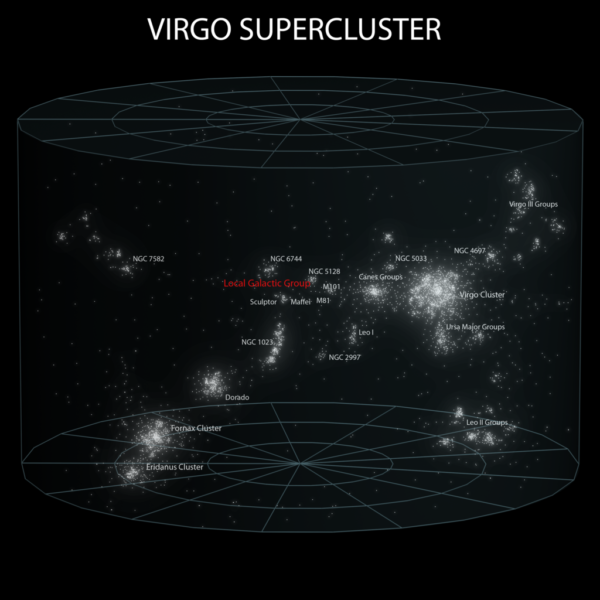"We now have the best picture of how galaxies like our own formed their stars." -Casey Papovich
The expanding Universe is counterintuitive in a lot of ways: on the largest scales, the distances between galaxies are increasing at an alarming rate, yet the distances between the stars in our own galaxies or the atoms in our bodies don’t appear to change. It makes one wonder whether there’s a size limit to how small a piece of the Universe can be and still expand?
 If everything expanded as the Universe did, then the coins would need to be replaced by paint. Image credit: "Fun with Astronomy" by Mae and Ira Freeman, via http://amzn.to/2aKd9qD.
If everything expanded as the Universe did, then the coins would need to be replaced by paint. Image credit: "Fun with Astronomy" by Mae and Ira Freeman, via http://amzn.to/2aKd9qD.
Oddly enough, General Relativity doesn’t really care whether you’re talking about subatomic distances or billions of light years, but it does care about whether the object you’re talking about is gravitationally bound to itself or not. This means an atom in deep space won’t expand, but also that a large cluster of galaxies (and everything in it) will only see the space beyond it expand, not the space within.


Alright, so here's the obvious opposite question by a contrarian, could it be that everything is shrinking, like for 'normal' matter that is cooling down, evaporating energy? It might make things less counterintuitive. So if you shrink, and I shrink, than the redshifting waves become wider in relation to us. Might be a simple case of semantics, style or pov.
Paul @1: you have made a very common and normal layperson's mistake in thinking about the universal expansion. When cosmologists say the universe is expanding, they are not saying that matter is expanding. Atoms aren't getting bigger. Bond lengths aren't getting longer, etc. Think of the expansion as if it's a very weak force, and like a weak force, it is overcome and rendered negligible when a much much stronger force is operating against it. Just like the Earth's gravity doesn't cause your legs to separate from your body (because it's much much weaker than the electromagnetic force that hold your atoms together), the universal expansion doesn't cause your atoms to get further apart.
So if there was a universal contraction going on instead of expansion, but it was basically about the same magnitude as the expansion we theoroize, then nothing would shrink. You wouldn't shrink, the Earth wouldn't shrink, etc. Thus the red shift we see cannot be a result of a contraction operating on the universe and causing photon frequencies to appear larger in relation to us, because we wouldn't be getting any smaller in relation to them.
Eric @2:
"the universal expansion doesn’t cause your atoms to get further apart."
Actually it does, that's the whole point of space expanding, mostly between different galaxies, only between nearby matter the 'expansion' is overruled and matter keeps sticking together.
Anyway, I guess that's also my answer right there; shrink or expand, either way 'the space between' is expanding and getting further apart.
Ethan,
If the space between galaxies is ever-expanding, what does that say for your assumption of the universe’s homogeneity?
I think you say the universe is homogeneous when viewed on the vaguely defined, or undefined, ‘largest scales.’
Whatever the hell those ‘largest viewing scales’ are supposed to be, I suppose you’d say they’d have to be ever-expanding as well?
Because I think you’ve written in the past that, given enough time, no stars/galaxies will be viewable outside of our galaxy.
The whole concept of an expanding universe is one of the single biggest pieces of evidence causing me to believe space is an actual thing and the properties of matter are tied up in it. It isn't just a coordinate system for overlapping frames of reference.
If mass and inertia were just properties of matter and not tied up in the fabric of space, nothing would expand. Nothing would need to be gravitationally bound. Simple inertia would be enough. The universe would be like a giant tablecloth trick on a tablecloth that pulled away in all directions rather than one.
https://www.youtube.com/watch?v=o94Pm-Cty3M
You seem to have an impressively selective memory. Again:
1. Isotropy implies homogeneity.
2. The CMB is isotropic to 1 part in $latex 10^{-5}$.
3. There is no evidence of anistropy on scales less than the distance to the surface of last scattering.
Of course, this all depends on the nature of Dark Energy. If it really is just a cosmological constant or quintessence in a certain form, then the universe will never expand quickly enough to dominate the other fundamental interactions that work to keep stuff together. But if the universe has a phantom energy quintessence though, space will eventually expand so rapidly that all structures bound by the other interactions will become unbound by it, producing a Big Rip.
"Alright, so here’s the obvious opposite question by a contrarian, could it be that everything is shrinking, like for ‘normal’ matter that is cooling down, evaporating energy?"
No.
A simple answer for a simple contrarian.
"“the universal expansion doesn’t cause your atoms to get further apart.”
Actually it does,"
Actually it doesn't. They close in together faster than they expand and the distances between the atom's constituents DO NOT get bigger.
"The whole concept of an expanding universe is one of the single biggest pieces of evidence causing me to believe space is an actual thing and the properties of matter are tied up in it."
WHY?
"If mass and inertia were just properties of matter and not tied up in the fabric of space, nothing would expand."
WHY would this be true?
"Nothing would need to be gravitationally bound."
WHY is this claimed?
"Simple inertia would be enough."
WHAT makes you claim this to be the case?
"The universe would be like a giant tablecloth trick on a tablecloth that pulled away in all directions rather than one."
And if it were a pink elephant, drunks would be more in touch with the universe than anyone else.
But they aren't, and the claim you made depends on several claims being evidenced as factually the case when you have supplied nothing to even attempt this requirement.